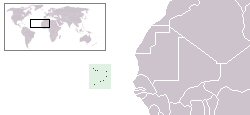Cesária Évora
Touches Deep in Your Heart
It was the spring of 2005 when I first listened one of Cesária Évora songs : Sodade. She was singing a duet with Eleutheria Arvanitaki. As I'm a real fan of Arvanitaki, this simply was enough reference for her.
In the live version of Sodade I've listened, Arvanitaki was singing Greek and Cesária Évora in Portuguese. I don't know even a word in Portuguese. Even though I was shocked and compelled with her deep and touching voice.
Being one of the three F's of Salazar (football, fatima,fado), fado is really an emotion intensive music that shakes your heart and soul. For most aspects, it's like traditional Greek music rembetika.
For a Turkish origin person, it's quite rational to enjoy rembetika for geographical and cultural links. But for fado in Portuguese, some other factors are needed for such a strong compel, like fabulous voice of Cesária Évora.
In wikipedia, it is written:Évora's voice, a finely-tuned, melancholy instrument with a touch of hoarseness, highlights her emotional phrasing by accenting a word or phrase. Even audiences who do not understand her language are held spell-bound by the emotions evident in her performances.
Exactly. This is what you feel when you listen to her music.
Cesária Évora
taken from wikipedia.org
Location of Cabo Verde
taken from wikipedia.org
When I first listened to Sodade, I thought that she's Portuguese. I was very surprised when I recently learned that she's from Cabo Verde, a small island-country in west Africa. Cabo Verde is an old Portuguese colony.
When Portugal discovered the island, it was inhabited. Then the island is populated mostly by slaves and some Portuguese and European settlers.
Now Cesária Évora makes her live performances bare foot to refer to problems of her deeply suffered homeland and her people.
When you look for web sites about Cabo Verde, you'll see photos of beaches, sunburn people, surfing girls etc. This apparent picture may hide unfortunate past of Cape Verde and Africa, but the voice of Cesária Évora reveals all the bitter truth to all uf us. Even to those who are far from there and who cannot understand even a word of her creole Portuguese.
By the way, I highly recommend you to read the article about Cesária Évora in wikipedia at here.
Furthermore, if you're not yet involved with wikipedia [wikipedia.org], please do, because it's an unbelievable source of free information.








